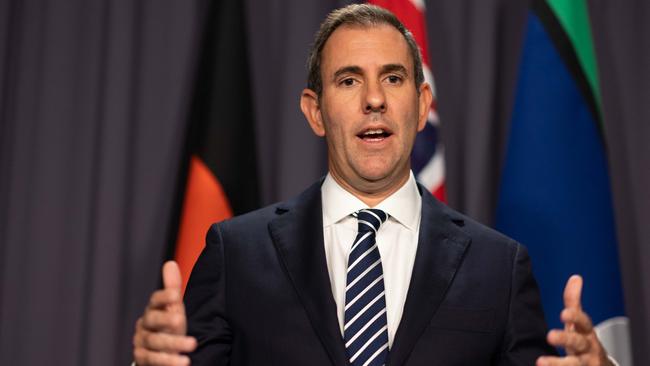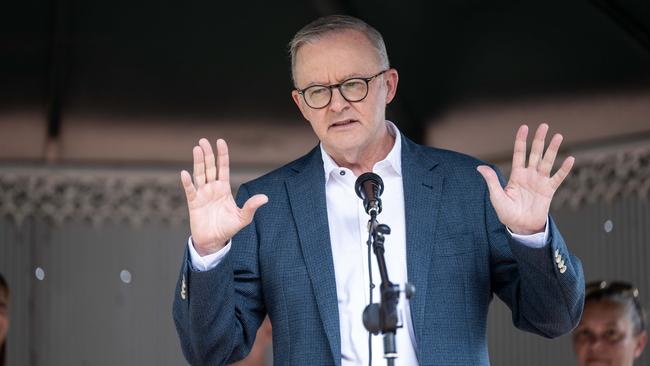Campbell: Government pressing on with taxing super is not without risk
The government’s plans to change superannuation hinge on far more than the tax rates of a few millionaires, writes James Campbell.
Opinion
Don't miss out on the headlines from Opinion. Followed categories will be added to My News.
At first glance, the government’s sudden and unexpected decision to open debate on taxing super looks like a re-run of its aborted attempt to chop the Stage 3 tax cuts.
As you will recall, Treasurer Jim Chalmers surprised us last October by making it clear he was up for “a conversation” about these legislated measures, despite a clear commitment from Labor six months earlier they would be left alone.
That conversation ended a few days later when the Prime Minister effectively told him to shut up.
Now as we head into pre-budget season Chatty Jim is back again, this time floating the idea that people with a few million in their superannuation accounts ought perhaps to be paying some income tax on the money they draw out of them.
As with the Stage 3, Labor made a clear promise that if it came to government it would leave these arrangements alone.

So will this end the same way? Unlikely.
While senior government ministers are at pains to state no decision has been taken, it’s clear at this stage they plan to press on.
“I don’t think we’re going to shut down the conversation,” is the blunt assessment of one Cabinet minister.
Another thinks that, having begun another debate of its own choosing, the government can’t afford another walk away.
“This is not unwinnable for us, I’d have thought we have to go through with it.”
The reason why this is so is obvious: the numbers.

For although the majority of the money in the Stage 3 tax cuts go to people on higher incomes – as is always the case – as they are currently legislated everyone on an income of more than $45,000 gets something.
On the other hand, the mooted changes to superannuation taxation touch hardly anyone.
If the threshold for tax were to be set at $5 million it would capture 14,000 people, if it were set at $3 million that would only rise to 32,000.
It won’t have escaped their attention either that, with the exception of Higgins in Melbourne, the majority of the seats with the most to lose are held by the Teals.
It’s not a risk-free exercise, of course.
In addition to the heat they have to wear over what is quite clearly a broken promise, even one that was only made to 32,000 people, there is the danger the Opposition succeeds in convincing people that this is only the beginning and your super isn’t safe in Labor’s hands.
Given these tax changes are only likely to raise $1 billion a year, some Liberals are wondering why the government is prepared to run that risk.

Critically, the Prime Minister is making it clear privately he sees the two debates very differently.
They might both be broken promises but the commitment to Stage 3 was well-ventilated in front of the voters before the election, whereas the tax rate of millionaires in their retirement was very much a niche issue.
There’s another reason the government thinks it can get away with these tax changes – the level of government debt.
The argument we are going to hear a lot more is that, having been left with $1 trillion in debt, Labor has no choice but to find money from somewhere to start paying it back.
Ministers believe the higher interest rate environment will help it to prosecute this argument.
“(If) people have a greater sense of what debt means to them, they will have a greater sense of what it means for the government,” a cabinet minister said.
Sure, expenditure is growing, the government will say, but look it’s only on worthy things like improving aged care, the NDIS and defence, which one of these would the Coalition like to cut?
If the government were only looking at changing the tax rates of a few thousand millionaire retirees, I would say they had a pretty good chance of winning the argument.
But that’s not all it’s doing.
The decision to set a tax hare running follows on from the earlier decision to open a conversation about whether super funds should be directed into nation building projects.
What exactly all these nation building projects might be hasn’t been made clear, though Chalmers has floated the idea that money might be used to “boost housing supply, manage climate change and spur digital transformation”.
Worthy objectives all of them, but not necessarily compatible with seeking the highest rate of return.
Indeed a cynic might wonder why, if these are all such winners, why the government feels the need to insert itself into this gold rush.
That it is alive to this danger was suggested by the fact Chalmers’ assistant Stephen Jones told the AFR this week “the first, second, and third objective of super funds is the best financial interest of the members. But if we can make housing or infrastructure investment stack up, what do we have to do to work in partnership?”
What indeed! On the compatibility of those objectives a lot is going to hinge. Far more than the tax rates of a few millionaires.





